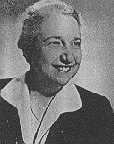[Curator's
note: Judith Waller's recollections of WMAQ's early days first appeared
in the April, 1947 issue of The Chainbreak, NBC-Chicago's employee
newsletter.]
Do you
remember? Well, maybe not---not all of you certainly. But there are
views that come back to mind, like a kaleidoscope of time turned backward.
There
was 1922, when one theatrical star after another came to broadcast
for publicity. Some were scared, like Sir Gilbert Parker who asked,
after the broadcast, "This only went over to the Daily News Building,
didn't it?" Ed Wynn reclined on the floor and Morris Gest was
so exhausted after an appearance he had to lie down for half an hour.
Rosa Raisa, the famous opera star, wanted to "sing one more leetle
song, it is sooch fun'' and Casella, the Italian pianist, wouldn't
use our Mason and Hamlin---so his own was hauled in.
Fortunately
we only had two hours a day to fill---since all radio stations shared
time on the same wave length. We had silent night in those days and
no Sunday broadcasts until 1927 because the owners of the Chicago
Daily News objected to issuing a paper on Sunday and carried the
rule over into its broadcasting operations.
The year
1927 brought our first commercial broadcast, too, The Golden Rose
of China, broadcast by Pratt and Sherman for the Baldwin-Knight Company.
Back
in 1926 the son of a friend of mine was bemoaning the fact he couldn't
go to ball parks. I wondered why baseball couldn't go to him and so,
timidly, I approached Mr. Wrigley with the suggestion. Whether the
humor of the situation or the new medium appealed to him, I never
knew, but WMAQ became the first station to offer such service to its
listeners. At the end of the season the Cubs finished last in the
league (through no fault of radio) but first financially--the women
had taken to baseball and beseiged Cubs' Park in droves.

